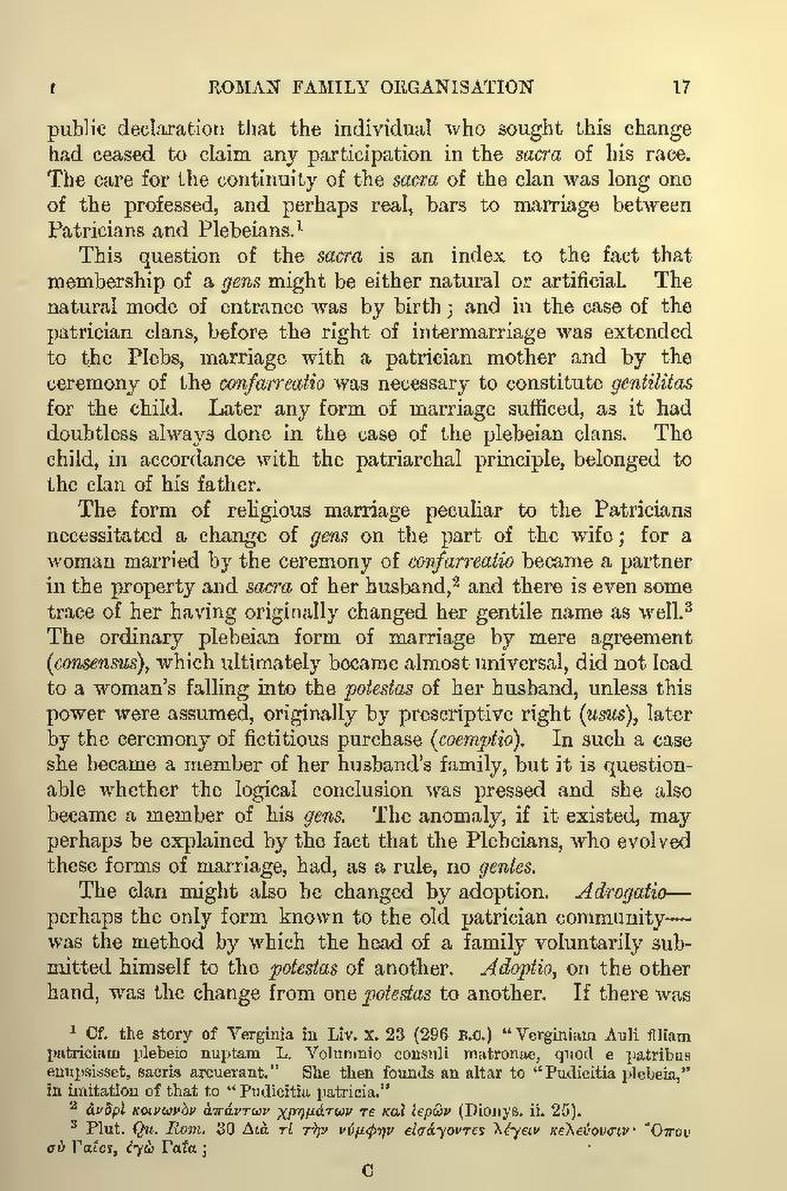public declaration that the individual who sought this change had ceased to claim any participation in the sacra of his race. The care for the continuity of the sacra of the clan was long one of the professed, and perhaps real, bars to marriage between Patricians and Plebeians.[1]
This question of the sacra is an index to the fact that membership of a gens might be either natural or artificial. The natural mode of entrance was by birth; and in the case of the patrician clans, before the right of intermarriage was extended to the Plebs, marriage with a patrician mother and by the ceremony of the confarreatio was necessary to constitute gentilitas for the child. Later any form of marriage sufficed, as it had doubtless always done in the case of the plebeian clans. The child, in accordance with the patriarchal principle, belonged to the clan of his father.
The form of religious marriage peculiar to the Patricians necessitated a change of gens on the part of the wife; for a woman married by the ceremony of confarreatio became a partner in the property and sacra of her husband,[2] and there is even some trace of her having originally changed her gentile name as well.[3] The ordinary plebeian form of marriage by mere agreement (consensus), which ultimately became almost universal, did not lead to a woman's falling into the potestas of her husband, unless this power were assumed, originally by prescriptive right (usus), later by the ceremony of fictitious purchase (coemptio). In such a case she became a member of her husband's family, but it is questionable whether the logical conclusion was pressed and she also became a member of his gens. The anomaly, if it existed, may perhaps be explained by the fact that the Plebeians, who evolved these forms of marriage, had, as a rule, no gentes.
The clan might also be changed by adoption. Adrogatio—perhaps the only form known to the old patrician community—was the method by which the head of a family voluntarily submitted himself to the potestas of another. Adoptio, on the other hand, was the change from one potestas to another. If there was(Dionys. ii. 25).]]
- ↑ Cf. the story of Verginia in Liv. x. 23 (296 B.C.) "Verginiam Auli filiam patriciam plebeio nuptam L. Volumnio consuli matronae, quod e patribus enupsisset, sacris arcuerant." She then founds an altar to "Pudicitia plebeia," in imitation of that to "Pudicitia patricia."
- ↑ [Greek: andri koinônon hapantôn chrêmatôn te kai hierôn
- ↑ Plut. Qu. Rom. 30 [Greek: Dia ti tên nymphên eisagontes legein keleuousin; Hopou sy Gaios, egô Gaia?
